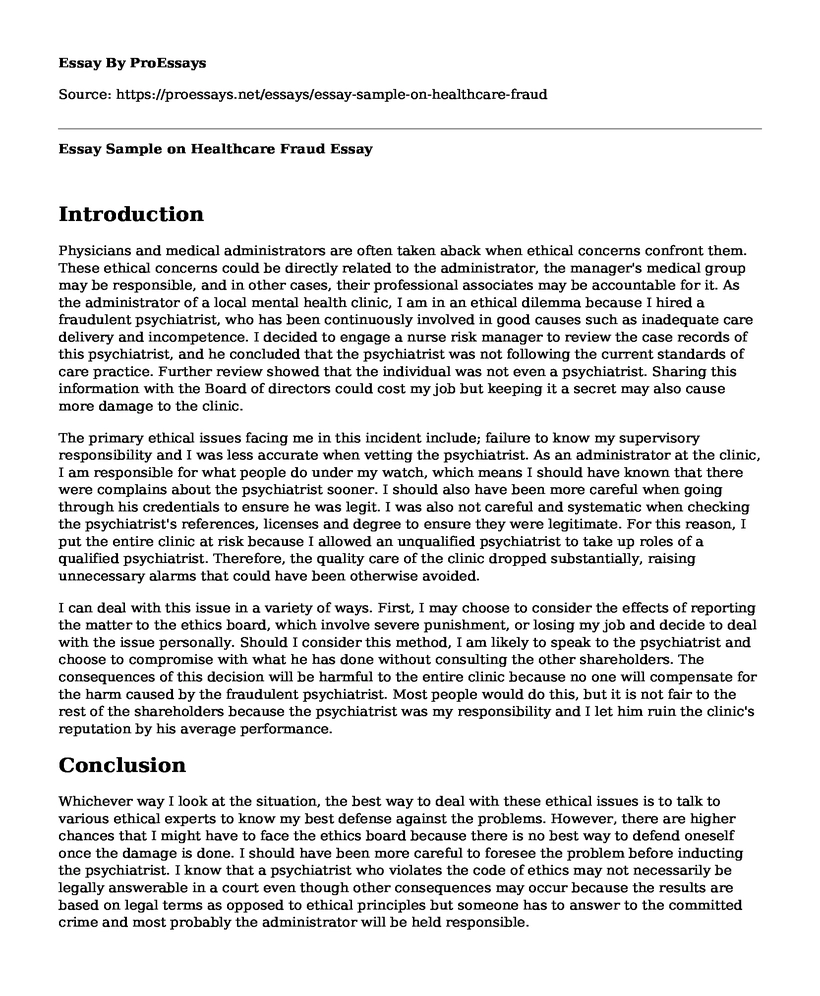Introduction
Physicians and medical administrators are often taken aback when ethical concerns confront them. These ethical concerns could be directly related to the administrator, the manager's medical group may be responsible, and in other cases, their professional associates may be accountable for it. As the administrator of a local mental health clinic, I am in an ethical dilemma because I hired a fraudulent psychiatrist, who has been continuously involved in good causes such as inadequate care delivery and incompetence. I decided to engage a nurse risk manager to review the case records of this psychiatrist, and he concluded that the psychiatrist was not following the current standards of care practice. Further review showed that the individual was not even a psychiatrist. Sharing this information with the Board of directors could cost my job but keeping it a secret may also cause more damage to the clinic.
The primary ethical issues facing me in this incident include; failure to know my supervisory responsibility and I was less accurate when vetting the psychiatrist. As an administrator at the clinic, I am responsible for what people do under my watch, which means I should have known that there were complains about the psychiatrist sooner. I should also have been more careful when going through his credentials to ensure he was legit. I was also not careful and systematic when checking the psychiatrist's references, licenses and degree to ensure they were legitimate. For this reason, I put the entire clinic at risk because I allowed an unqualified psychiatrist to take up roles of a qualified psychiatrist. Therefore, the quality care of the clinic dropped substantially, raising unnecessary alarms that could have been otherwise avoided.
I can deal with this issue in a variety of ways. First, I may choose to consider the effects of reporting the matter to the ethics board, which involve severe punishment, or losing my job and decide to deal with the issue personally. Should I consider this method, I am likely to speak to the psychiatrist and choose to compromise with what he has done without consulting the other shareholders. The consequences of this decision will be harmful to the entire clinic because no one will compensate for the harm caused by the fraudulent psychiatrist. Most people would do this, but it is not fair to the rest of the shareholders because the psychiatrist was my responsibility and I let him ruin the clinic's reputation by his average performance.
Conclusion
Whichever way I look at the situation, the best way to deal with these ethical issues is to talk to various ethical experts to know my best defense against the problems. However, there are higher chances that I might have to face the ethics board because there is no best way to defend oneself once the damage is done. I should have been more careful to foresee the problem before inducting the psychiatrist. I know that a psychiatrist who violates the code of ethics may not necessarily be legally answerable in a court even though other consequences may occur because the results are based on legal terms as opposed to ethical principles but someone has to answer to the committed crime and most probably the administrator will be held responsible.
Cite this page
Essay Sample on Healthcare Fraud. (2022, Jul 08). Retrieved from https://proessays.net/essays/essay-sample-on-healthcare-fraud
If you are the original author of this essay and no longer wish to have it published on the ProEssays website, please click below to request its removal:
- Risk Reduction Strategies Aimed at Preventing Wrong Site Surgery
- Bitcoin and Its Controversies Essay
- Paper Example on Diabetes in African Americans
- Essay on Water: Essential for Food Security, Sustainability and Ecosystems
- Essay Example on Modernizing Hospital Data Collection: Leveraging Tech for Efficiency
- Ethical Dilemma in Withdrawing Life-Sustaining Treatment for Severely Disabled Infants - Research Paper
- Navigating Digital Transformation in Higher Education: Priorities in Language Learning During the Pandemic







